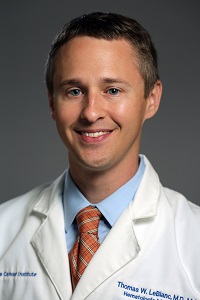ASH members help shape the Society’s advocacy efforts by speaking up about policies that need to be changed to help improve care for patients with hematologic diseases and disorders. Numerous ASH members have raised concerns about the lack of access to palliative blood transfusions for individuals with hematologic malignancies seeking the Medicare hospice benefit. In response, ASH established the Palliative Care Working Group and made this issue a focus of its advocacy efforts. The Hematologist recently spoke with Drs. Kevin Curran and Thomas LeBlanc, two ASH members who are currently serving on the ASH Palliative Care Working Group. Dr. Curran is the Pediatric Director of the Cellular Therapeutic Center at Memorial Sloan Kettering Cancer Center in New York City, and Dr. LeBlanc is a hematologist-oncologist at the Duke Cancer Institute in Durham, North Carolina. In addition to treating patients with blood cancers, Dr. LeBlanc is also trained in palliative medicine and conducts studies of integrated palliative care for patients who are early in cancer treatment.
ASH was alerted to this issue through stories from members whose patients with blood cancers were not accessing timely hospice care due to barriers to receiving blood transfusions in the palliative setting.1 While many believed this was owing to transfusions not being covered under the Medicare hospice benefit, the Centers for Medicare and Medicaid Services (CMS) has repeatedly clarified that palliative transfusions are a covered Medicare hospice benefit. Palliative transfusions often help improve the quality of life for patients nearing the end of life. Hospices are required to cover all items, services, and medications for the palliation and management of terminal illnesses and related conditions, including blood transfusions. Yet, in practice, many hospices choose not to provide palliative blood transfusions because the cost of these treatments is very high relative to the daily reimbursement rate that they receive from Medicare for hospice care services (referred to as the per diem payment).
Dr. Curran noted that he decided to volunteer his time to serve as the vice chair of the Palliative Care Working Group because ASH “identified a problem that was negatively impacting both hematology doctors and our patients.” He stated that “for patients undergoing cancer therapy, their goals are split between cure and quality of life. Unfortunately, when modern medicine fails to provide a cure, the focus shifts to maximizing quality of life.” However, although patients in their final stages of treatment benefit from blood transfusions, their inability to receive blood products results in a low enrollment to hospice programs. Dr. Curran stressed that “working on a fix to this problem was our motivation to form the task force and find a practical solution.”
Dr. LeBlanc has spent much of his career focused on palliative medicine and has also seen firsthand the challenges that patients with blood cancers face getting quality end-of-life care. His focus on the issues that his patients struggle with was one of the driving factors in deciding to volunteer his expertise for the Palliative Care Working Group. “During my training, I realized that patients with blood cancers often experience poor end-of-life care, with a high rate of death in the hospital,” he said “I also saw that we often poorly manage patients’ symptoms, distress, and quality of life, owing to a sometimes farsighted focus on cure, with inadequate attention to the patient experience of illness and treatment along the way.” Dr. LeBlanc stated that his long-term goal is to help foster significant improvement in palliative and end-of-life care issues in hematology. “When I learned that ASH had decided to prioritize these issues in the coming years, I very happily agreed to participate,” he said.
The working group has helped ASH come up with three recommendations that will start to address the problem of patients in hospice care being denied blood transfusions. Specifically, ASH recommends that:
CMS work with hospice agencies and administrators to clarify that palliative transfusions are a covered benefit and should be symptom-based and performed in collaboration with hematologic oncologists;
CMS work with hospice agencies to create innovative reimbursement models to promote the provision of palliative transfusions, such as allowing them to be paid for separately under Medicare Part B; and
CMS work with hospice providers and other stakeholders to explore novel ways to access transfusions, such as at-home transfusions.
To ensure that these recommendations are enacted, Dr. LeBlanc traveled to Washington, DC, in 2019 to meet with congressional offices. The goal of these meetings was to raise awareness and educate members of Congress about this issue – many policy makers in Washington have simply never heard of it before. While on Capitol Hill, Dr. LeBlanc and ASH staff found a receptive audience from congressional staffs. “Given all of the misconceptions about palliative care, I think it is most powerful to learn about it directly from those who have experienced it and benefitted from it,” said Dr. LeBlanc on the need to tell firsthand stories when conducting advocacy with members of Congress. ASH has continued to visit congressional offices and has promoted the recommendations that the ASH Palliative Care Working Group has created and continues to focus on.
The Palliative Care Working Group is also committed to spreading awareness, not just on Capitol Hill, but also with fellow hematologists. “Our job is to educate and provide the resources to ASH membership, patients, and those who can influence palliative care benefits within our health-care system,” said Dr. Curran. Dr. LeBlanc explained, “I find that hematologists and oncologists are often pleasantly surprised about how helpful palliative care specialists can be in augmenting the already excellent care that each of us strives to provide every day.”
Interested in becoming more involved in ASH’s advocacy efforts? Visit www.hematology.org/Advocacywww.hematology.org/Advocacy for additional information and to access ASH’s online advocacy toolkit. The Society is dedicated to supporting its members in advocating for hematology at the local, state, and national levels of government. Drs. Curran and LeBlanc both encourage colleagues to participate in ASH’s advocacy work by signing up for the ASH Grassroots Network to receive regular updates and information about how to stay in touch with members of Congress on a range of issues impacting hematology.


